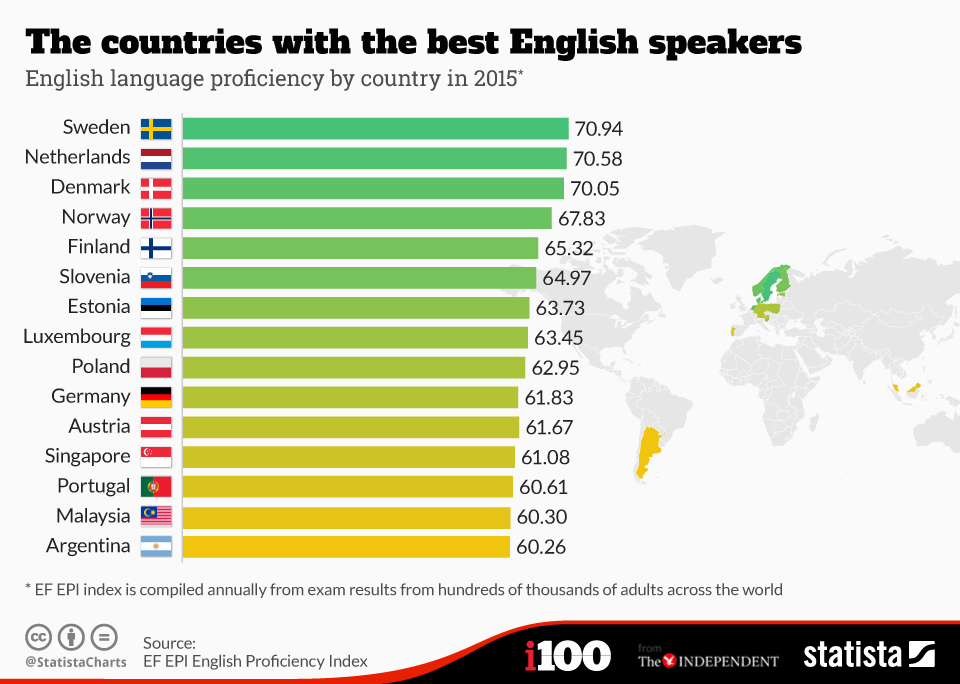Moving to a new country where you don’t know the language, but think it’s okay because everyone speaks English? Think again. Here are 5 reasons you should learn the language of the country you live in.
1. Basic Courtesy
Simply put, it’s rude if you have moved into a new, non-English speaking country and are expecting everybody to speak English to you. Even when I go on holiday for 1 or 2 weeks to a foreign country, I make an effort to learn the basics. At the very least I will learn greetings and pleasantries.
It can be hard because chances are, many of the citizens in your new country are going to speak some level of English.

Did you know?
According to statistics from 2015, over 60% of Germany speak English!
They will also be very excited to practice their English skills on you, a native speaker. I have found this to be one of the biggest difficulties in my German learning process so far. It’s very complimentary, but I also want to practice my German speaking skills to integrate myself into the community!
Do not let the fact that so many people speak English deter you from pushing on with learning the local language regardless. If nothing else, it feels amazing to say that you’re bilingual!
2. Understanding of Culture and Country
How do you expect to fully integrate yourself into a new community and culture if you make no effort to learn the language? Just picking up the basics will allow you further insight into the country you have chosen to call home. Even if you do not plan to stay long term, it’s a worthwhile investment that will make your time in the country a lot easier.

As an example, there were two things I was told about Germans before I moved: they’re rude and they have no sense of humour. I am here to confirm that neither of those is true. Since starting to learn the language, and therefore learning a little bit more about the way the country works (German bureaucracy wassup!), I have a further understanding why Germans have such a direct nature.
3. It’s Required
When we moved, we were still part of the EU. I believe this made the whole process a lot easier because we essentially just rocked up and registered as residents without too much of a problem.
For expats and immigrants from outside the EU, it is more difficult. You may require a visa and often have to meet language requirements to be able to legally work in the country.
If you are wishing to study in a particular country, you must also meet a certain language level as part of the entry requirements. I believe this is usually C1/C2 (near-native proficiency) at a minimum and you must provide your certificate or take a test on application.
4. Job Opportunities
I’ll admit it, I was one of these people. As a native English speaker, I had the arrogance to think that finding work would not be a problem, because having an English speaker is an asset to every company. Not to worry, that arrogance was very quickly knocked out of me.
Due to the fact that almost everyone in Germany speaks English, particularly those under 40, most companies already have English speakers that assist with international business.
It is possible to find work without knowing the language, more so if you work in a specialist field. However, more possibilities will be available if you have a good understanding of the foundations of the language. Many companies will at least grant you an interview if they can see you are actively trying to learn the language and demonstrate some of those skills.
5. Admin
Particularly true in Germany, where bureaucracy plays such an important role in everyday life. There are forms for everything. EVERYTHING.
Our landlord returned some money to us last month because we didn’t use our “allotted” amount of water/heating for last year. We had to sign a big ol’ form just to say it was okay that our landlord gave us €100 back. It’s not like we were going to disagree with that…
Whatever country you move to, there will always be a certain number of forms and contracts to be signed. It makes things a lot easier if you can understand what information you need to be providing. I have had several panic attacks over forms in Germany because the wording can be a little scary when usually it’s pretty simple.
Even if you don’t plan on living in your new country forever, having knowledge of/being fluent in, a second language has many benefits.
It was the first thing I started working on when we decided to take the leap. It was also the first thing I thought about having on my CV if/when we move back to the UK.
Learning a language is frustrating at times, especially when there’s a million different ways to say the word “the” depending on the case and gender of a word…

But I am really enjoying the process! Whenever I go to the supermarket, watch TV or read the newspaper, I understand a bit more each time. That is a really rewarding feeling to have.
Hope you enjoyed this week’s blog. I really enjoyed writing this one ☺️
bis zum nächsten mal!
Steffi x
If you enjoyed this post, check out some of my other language posts:

Pingback: Why a language learning break can help you get better - Adventures of Steffi
Pingback: 8 great reasons you need to learn another language.
Pingback: LALIA BERLIN LANGUAGE SCHOOL - IS IT WORTH IT? COMPLETE REVIEW!